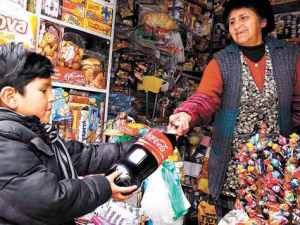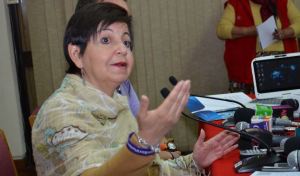
In Bolivia, ‘Coke’ reverses price hikes
As major international confrontations go, the recent face-off between The Coca-Cola Bottling Company and the Bolivian government is not going to make headlines in the U.S. press. Still, it deserves mention.
On Oct. 10, two days before the presidential election, the Coca-Cola distributor in Bolivia, known as Embol, announced that it was raising the prices of the popular beverage, from $1.46 for a 2Ω-liter bottle to $1.60, and from 65 cents to 95 for a 2-liter bottle. A single bottle would go from 35 cents to 45.

This, in a country where the average monthly wage is $175 and the consumption of that particular beverage is high, raised eyebrows at the Ministry of Productive Development, whose minister, Teresa Morales Olivera, denounced the move as “political.”
“Coca-Cola’s step is an openly political act and an assault on Bolivians’ wallets, because it is announced exactly two days before the general elections,” she said the same day. Sales of the drink had been on the increase in Bolivia and Chile, she pointed out, and the price of sugar had remained steady, even declined.
Also, she said, the price increase was a devious way for Embol to pass on to its customers the cost of the Christmas bonus every business must pay its employees by law. The Christmas bonus is a once-a-year outlay, she pointed out; the price increase is permanent.
And an unauthorized price hike would contribute to inflation, thus providing ammunition to critics of the government.
Coca-Cola is one of the principal buyers of Bolivian sugar. The company benefits from a government directive that limits the exportation of sugar, so that its domestic industrial use will always be protected and its price kept low.

The leader of the Federation of Factory Workers, Vitaliano Mamani, was even more emphatic. The price hike for Coke, Sprite and Fanta — all Coca-Cola brands — was an “abuse,” because the transnational giant sought to increase its profits “at the expense of Bolivians’ budgets,” he said.
“I was a sugar worker, and when sugar cost $38 for 100 pounds — a price set by the government — [Coca-Cola] sold its beverages cheap. Now that the price of sugar has dropped, it is raising the prices. That simply can’t be,” Mamani said.
Minister Morales herself is familiar with sugar production and sales. Prior to being appointed to her current post, she was general manager of Bolivia’s San Buenaventura Sugar Company. (She is not related to President Evo Morales.)
Within hours of Embol’s announcement, she summoned manager Jaime Tapia and reminded him that the government’s policy is to reduce inflation. Unjustified price increases go counter to that policy, she told him.
The upshot: Embol agreed to cancel the price boost, but the Ministry placed the company’s products on the list of food-basket items that it monitors weekly to prevent price gouging.
As reported by the news agency DPA, Embol enjoyed an 18-percent increase in sales volume last year, representing a net increase in profits of 7.5 percent. Per-capita consumption of Coca-Cola in Bolivia last year was 53 liters (14 gallons), according to Embol.


